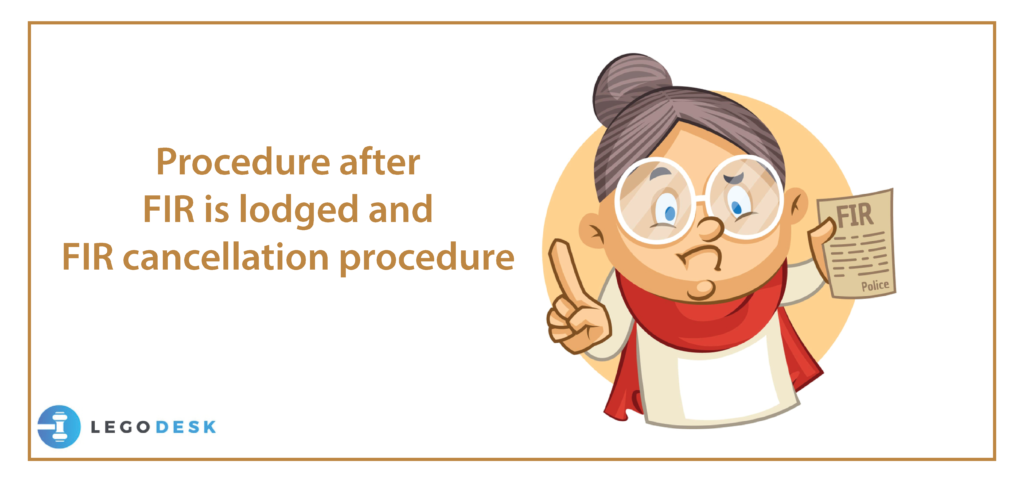Procedure after FIR is lodged and FIR cancellation procedure
Introduction
The first information report is a written report prepared by the police department of the respective police station where the crime (Cognizable offense) has occurred. This is an essential practice which gives a kickstart to a criminal proceeding in a court. It is prevalent in countries like India, Bangladesh, Pakistan, etc. An FIR is generally logged by the victim of a cognizable offense. However, in the cases where the victim is deceased or is in such a condition as unable to lodge an FIR, someone on his behalf can also lodge an FIR either orally or in writing to the police. FIR is defined under Section 154 of the Criminal Procedure Code, 1973. As the name itself suggests, An Fir must contain all the information which the victim is possessing about the cognizable offense. Also, Fir must be read to the person giving information or lodging complaint to the police and must contain his signature. This prevents cases of fraud FIRs lodged by the police officials if the complainant is illiterate.
After lodging an FIR
Once the FIR is lodged, the police can start the investigation work. The investigation includes collecting evidence, questioning witnesses, inspecting the crime scene, forensic testing, recording statements of the witnesses. It is always said that, after experiencing a cognizable offense, the first thing a victim should do, is to lodge an FIR. The reason for the same is attributed to the fact that, if there will be a considerable amount of time duration between the commission of a crime and lodging an FIR, this will give an opportunity to the offender to manipulate the shreds of evidence, eye-witness or any such material which can turn the judgment of the bench. For example, in rape cases, certain medical tests are to be conducted within a span of 2 days. Otherwise, there will be no evidence left in the victim’s body.
Once the stage of investigation is completed, the police may form a Charge Sheet often called as Challan and record their findings in it. If it is deemed that there is enough proof in the charge sheet, the case reaches the court.
Also, if after the completion of the investigation, the police concludes that there is not enough evidence, so as to establish the crime, they may close the case. Reason for closing the case must be backed by a rational in the competent court of jurisdiction.
When authorities refuse to lodge an FIR
Remember, that no police station can deny for lodging an FIR and they have to do this free of cost.
- You can contact Superintendent of Police or any other high officials and bring to their notice the complaint filed by you.
- You can contact such high officials by sending the complaint to them in writing. If they are satisfied by your complaint, they may order for the investigation of the case of may investigate the case himself.
- A private complaint can be lodged in the court of competent jurisdiction.
- You approach the authorities such as the State Human Rights Commission or the National Human Rights Commission.
Filing a Criminal Complaint accompanied by Vakalatnama and Court Fees
This is a petition which is submitted by the complainant authorizing an advocate to plead the case. This contains written allegations of the complainant, the summary of the happening of offense and the complaint prays for the relief he seeks for the same.
Criminal Complaint must be accompanied by a Vakalatnama. It gives the advocate (Who will be representing you in the court) the authorization to fight for justice, appear on his behalf, and handle all the court procedure. The lawyer who has signed the Vakalatnama is bonded by all the duties of an advocate, such as Attorney-Client Privilege. All such terms and conditions are explicitly mentioned in Vakalatnama.
Plaints are also required to be accompanied by court fees to be paid to the court. The amount of court fees is governed by the rules an regulations embodied in the Court Fees Stamp Act. Court fees are usually a nominal percentage to the suit value, and it differs from case to case.
Cancellation of FIR
Once the Fir is registered, FIR cannot be canceled. Even when the complainants urge for the same. It can be disposed of only as per the manner prescribed under the Criminal Procedure Code.
FIR is disposed of in the following circumstances-
- When the Offender cannot be traced even after making all possible efforts, and there are no changes for finding him in the future.
- When the Complainant has registered a false complaint.
- The accused person dies before filing the charge sheet against him in the court.
- When the complaint withdraws the case or requests the court to refer the case to Lok Adalat/ National Lok Adalat. So that the case can have a lead towards settlement.
In addition to the aforementioned circumstances, the government has the power to withdraw prosecution of a criminal case against him in the court. This power is conferred under Section 321 of the Criminal Procedure Code.
Conclusion
All citizens should get to know about their rights to filing FIRs. At the same time, they must be aware of the steps that they can take if the police refuse to register their complaints. In some cases, it is best to file a complaint petition before the judicial magistrate instead of registering an FIR.
Try our Debt Resolution solutions today Request a Demo

FLS21155866-please cancel the police case
Hi,
We do not provide these kind of services.
We have our mobile which is lost pls un block the mobile number 8296795368